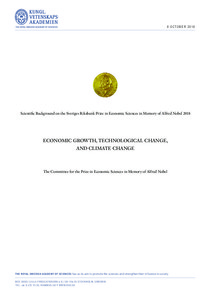Economic growth, technological change, and climate change
"This year's prize rewards the design of models and methods to address some of the most fundamental and pressing questions of our time, involving the long-run development of the global economy and the welfare of its citizens. Paul M. Romer has given us new tools for understanding how long-...
| Institution: | ETUI-European Trade Union Institute |
|---|---|
| Format: | TEXT |
| Language: | English |
| Published: |
Stockholm
2018
The Royal Swedish Academy of Sciences |
| Subjects: | |
| Online Access: | https://www.labourline.org/KENTIKA-19303676124911218589-economic-growth,-technological.htm |
| Summary: | "This year's prize rewards the design of models and methods to address some of the most fundamental and pressing questions of our time, involving the long-run development of the global economy and the welfare of its citizens. Paul M. Romer has given us new tools for understanding how long-run technological change is determined in a market economy, while William D. Nordhaus has pioneered a framework for understanding how the economy and climate of our planet are mutually dependent on each other. In his focus on the fundamental endogeneity of technological change, Romer has emphasized how the economy can expand the boundaries - and thus the possibilities - of its future activities. In his focus on the fundamental challenges of climate change, Nordhaus has stressed important negative side effects - and thus the restrictions - of the endeavors to bring about future prosperity. Both Romer and Nordhaus emphasize that the market economy, while a powerful engine of human development, has important imperfections and their contributions have thus offered insights into how government policy could potentially enhance our long-run welfare." |
|---|---|
| Physical Description: | 50 p. Digital |

